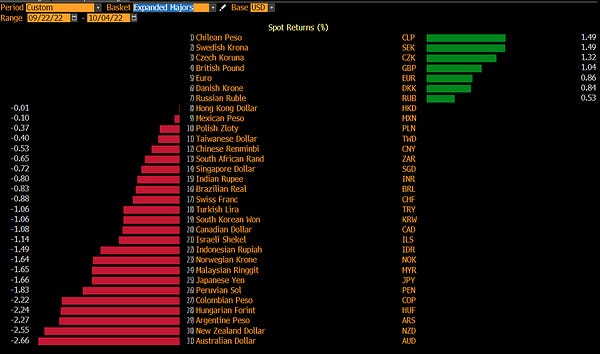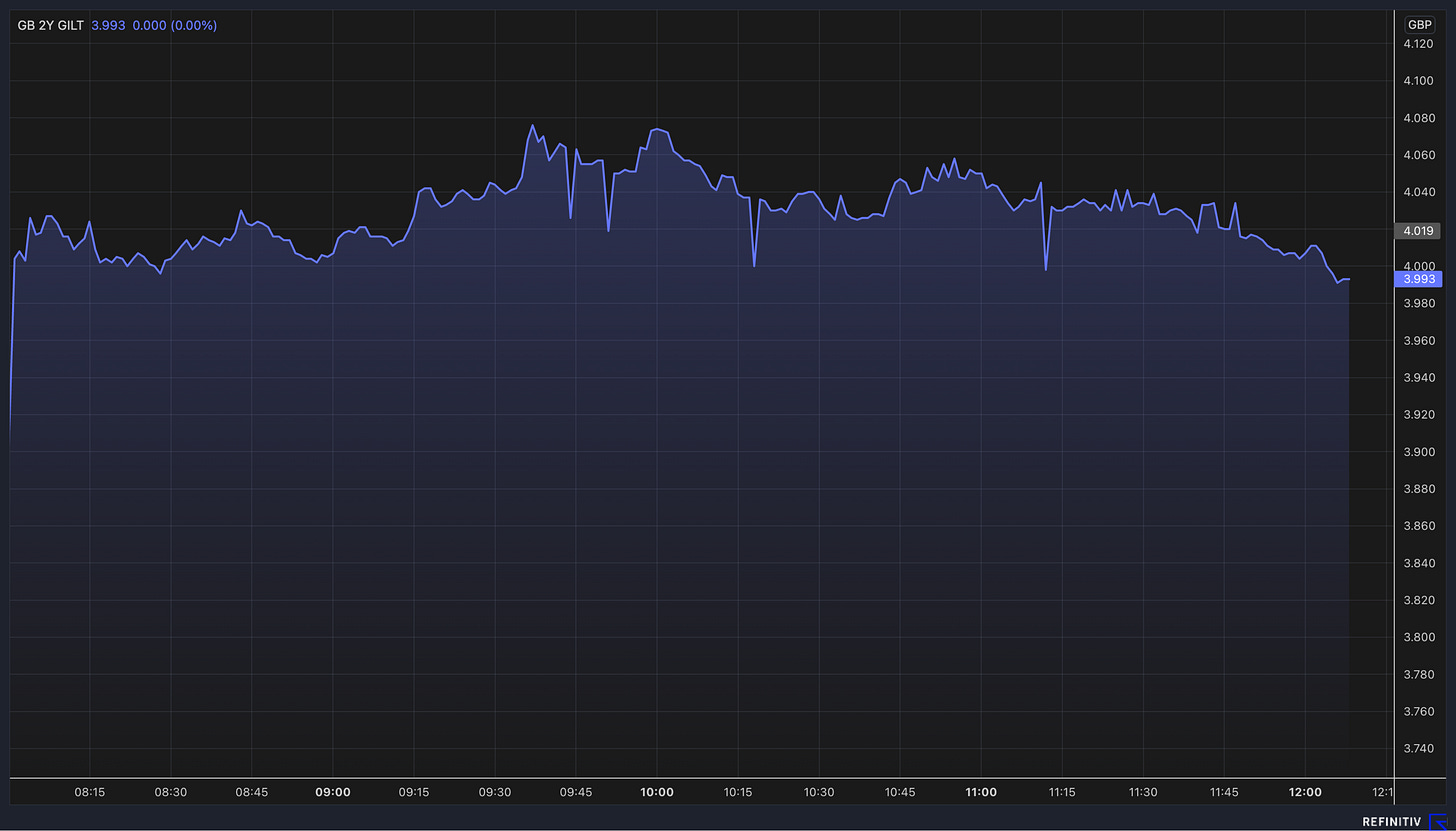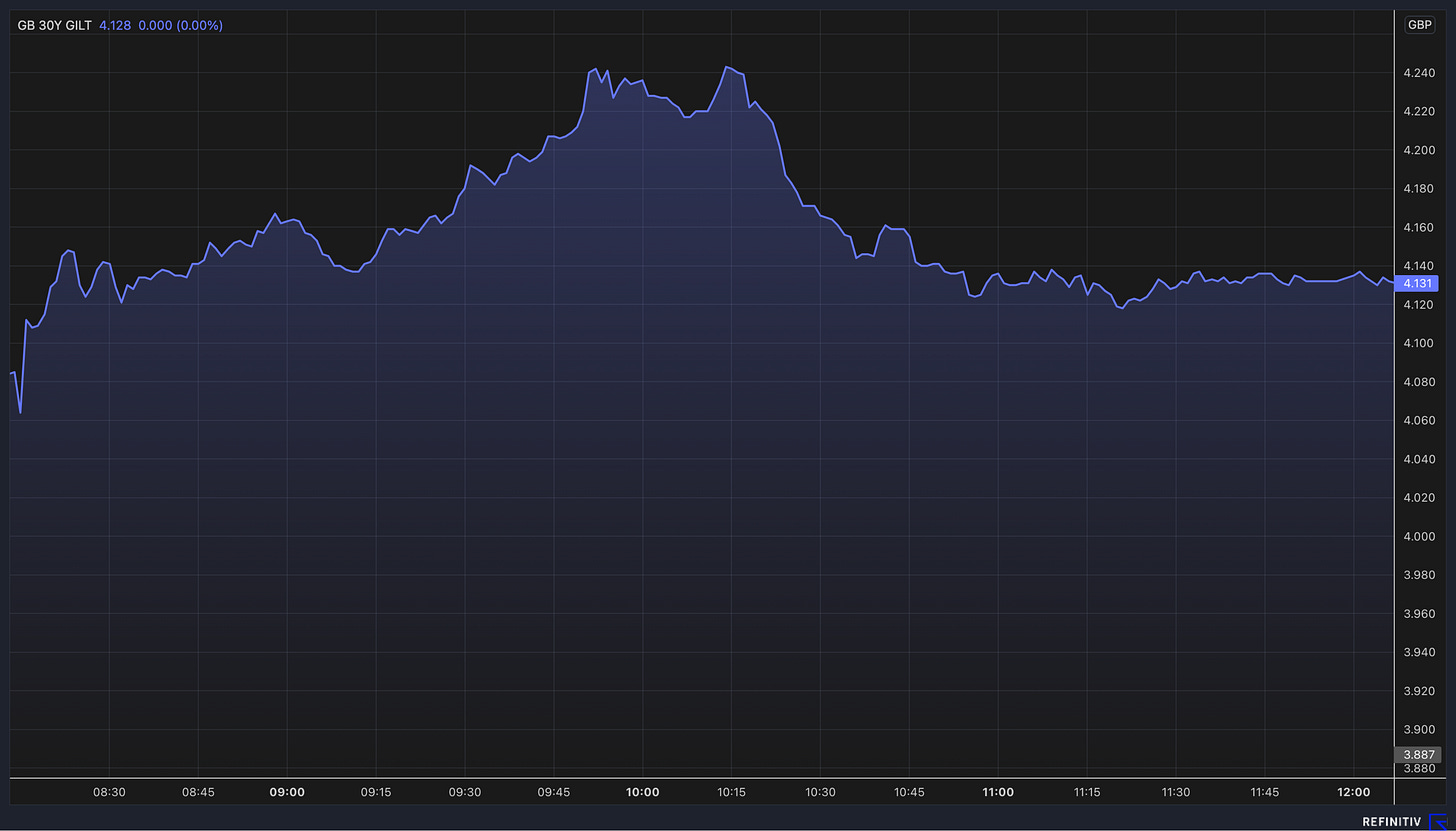First things first, get ready for the inevitable stories about what Heather Small and M People think about their song - Moving On Up - being used as the entrance music for Liz Truss’s speech at the Conservative party conference. The stories should be entertaining…




There have already been a few wisecracks about the decision to use that song…


There will also be stories about how the speech was disrupted by two Greenpeace protestors. However, I want to focus on two bits of analysis about the speech that really matter - how markets reacted and what we learned about Truss’s economic plans, particularly for the UK outside London and levelling up, a key focus on this newsletter.
Firstly, markets. The pound has fallen today, and did during the speech, which was between 11am and noon. It is down 1 per cent against the dollar today…
And here are gilt yields, which effectively show the interest rates that markets charge the government on its debt, and feeds through to mortgages…
This is the 2-year gilt yield, it has barely moved…
And this is the 30-year yield, which was also flat during the speech…
Overall, therefore, the reaction in the gilt market has been relatively calm, which will be a relief for the government. The pound has dropped, and it has dropped more against the dollar than other currencies, with the euro down 0.6 per cent against the US currency today. However, a reminder that the pound has rebounded notably from its slump a week ago…


There were no surprises on tax or policy in the speech and Truss expressed her support for the “dynamic new chancellor” Kwasi Kwarteng.
However, I thought the most interesting parts of the 30-minute speech were about Truss’s approach to economic growth and levelling up. While we have heard a lot about tax and potential spending cuts so far during her tenure, the details of the prime minister’s approach to actually getting the economy growing and attracting investment - so-called supply-side measures - have been pretty vague.
For those doubting where levelling up sits on Truss’s agenda, there were clear signals it remains front and centre. For instance, she started her speech with a reference to the success of the Conservative mayor of West Midlands, Andy Street (Off to Lunch interviewed Andy Street back in the summer here) and her own background in Paisley, Scotland, and Leeds.
While “levelling up” was notably absent as a phrase, she mentioned the need to “level up” multiple times. She also spoke about how “we need to fund the furthest behind first” and, in an echo of Tony Blair’s “education, education, education” pledge, said that “growth, growth, growth” was her priority.
The absence of “levelling up” as a phrase is one example of how Truss’s approach to the economy outside London in the UK will be different to Boris Johnson’s. Another is a desire to put business front-and-centre of economic growth outside London, rather than the government. Under Johnson, there was frustration that parts of the levelling up strategy were being controlled by Westminster, rather than power being handed to local authorities and local businesses to drive investment and growth. Just one example of this was the row about the location of Manchester’s HS2 station, which we covered here. However, it is clear Truss wants to put the onus on business. Truss saying that she wants the UK and the proposed new investment zones to “be inspired by the great hubs of industry”, referencing Bournville in the West Midlands, which was developed by the Cadbury family, will be welcomed by many in the business world. It was recognition that it is businesses who will level up the economy, not politicians. There are plenty of examples around the world of economies that thrive outside the capital city because of business investment and the presence of strong, growing employers - look at the US or Germany.
Having said all of this, we still await policies and detail on how the government proposes to help businesses do this. For instance, the government has not said which parts of the UK will be picked as investment zones and benefit from what Kwarteng has described as an “unprecedented” collection of tax incentives. Also, listening to Truss, I thought back to my podcast interview with Archie Norman, the chairman of M&S, and his fascinating comments on the need for governments to have a long-term vision to attract investment. Did Truss address that? I think not. You can read Norman’s comments here if you are a paying Off to Lunch member (you can sign-up via the link if not) but his key comment is below. As the chairman of one of the biggest employers outside London, a former Tory MP, and one of the most influential business leaders in the UK in the last 40 years, Norman is worth listening to:
I believe that the success of the economy depends fundamentally on productivity, on investment, on your knowledge base, on your skills, on your investment in science, etc. I don't think it depends on whether you tweak tax one way or the other. I'm not against tax cuts, but I don't think you'll change the trajectory of the economy by reducing corporation tax. Why does the Singapore economy or the US economy grow faster than ours? It's not to do with overall tax rates. It’s to do with the investment in science, the micro-economic makeup. The government’s effect on education, on skills, levelling up, investment and trade is strong. Good government is very much engaged as a partner with business and the enterprise economy to try and reshape that.
Now the trouble with that is it is all long-term. A supply-side strategy, or what we used to call an industrial strategy, apparently now we are not meant to call it that, should take a 10-year view to be effective. I believe that if people looking to invest in Britain, people looking to go into business in Britain or come to Britain to work, knew that the government had the foresight to have a long-term vision of how Britain was going to compete, how we're going to create a great workforce, how we're going to invest in science, how are we going to attract entrepreneurs here, it will give them great confidence to see it through this crisis and want to invest here anyway. Without that, even though it doesn't impact the next 12 months, you feel a bit rudderless.
Podcast….
A reminder that episode two of our Business Studies podcast - Philip Morris, Vectura and the end of cigarettes? - is available to listen to now on Substack and on all podcast platforms. You can listen here on Substack or here on Apple for iOS devices or Google on Android.
On Friday there will be bonus content for paying Off to Lunch members. I will be offering further thoughts on the big issues brought up by the episode, picking out the most interesting quotes in it, and looking at Philip Morris’s exit from Russia, which is another controversial story. Thanks for all the brilliant feedback on the episode. It’s a controversial and difficult story to cover but one I wanted to address, and it’s clearly got a lot of people thinking, which was exactly the intention…
Substack android app…
There is a new way to read Off to Lunch and listen to our Business Studies podcast. Substack has this week launched an Android app after the successful launch of the iOS app earlier this year. As an Android user myself, and someone who has been testing the app, I highly recommend it…
Other stories that matter…
Warren Buffett and his business partner Charlie Munger have been uncharacteristically coy over the years when it comes to answering questions about what it takes to be the next Warren Buffett. Well, this piece has a go instead. It pulls together quotes from Buffett and Munger - and others - to try to analyse how to follow the Sage of Omaha. Fun read (Neckar’s Minds and Markets)
One of the best explanations I have read from the US on what Elon Musk is up to with his U-turn on buying Twitter. In short, no-one really knows what he is thinking, but his legal case wasn’t going well and he can’t have been happy about private text messages being made public (Platformer)
Birmingham is working on its own version of Oktoberfest that organisers say “could easily become one of the biggest beer festivals” (BusinessLive)
Using Google to access information can make retail investors overconfident and ruins your performance, according to new research (Klement on Investing)
Apple will change the charger on its iPhone to make it the same USB-C port as other smartphones after an EU vote (Guardian)
Last week I flagged that Manchester has one of the best bars in the world according to Bloomberg’s list of the top 100. Well, they just published the rest of the list, including the top 50. Paradiso in Barcelona is number one (Barcelona also has Sips at number three) and this is the first time somewhere outside London or New York has topped the list. London’s Tayer & Elementary on Old Street is number two. Six of the top 50 are from New York, more than anywhere else (Bloomberg)
As a dog person who was pushed into buying cats, this piece amused me and definitely resonated…(The Atlantic)
I’ve written about David Epstein’s book Range, the brilliance of generalists over specialists and his Roger Federer example before. Well, he has written about Federer in more depth after his retirement and what we can learn from the fact the greatest tennis player of all time played various different sports before only specialising in tennis when he was a teenager (Range Widely)
Thanks for reading. Off to Lunch will be back on Friday. If you enjoy Off to Lunch then please share it with others and spread the word. If this newsletter was shared with you then please sign-up below to become a member, get Off to Lunch sent directly to your inbox, attend our forthcoming events and contribute to the work of Off to Lunch
Best
Graham









